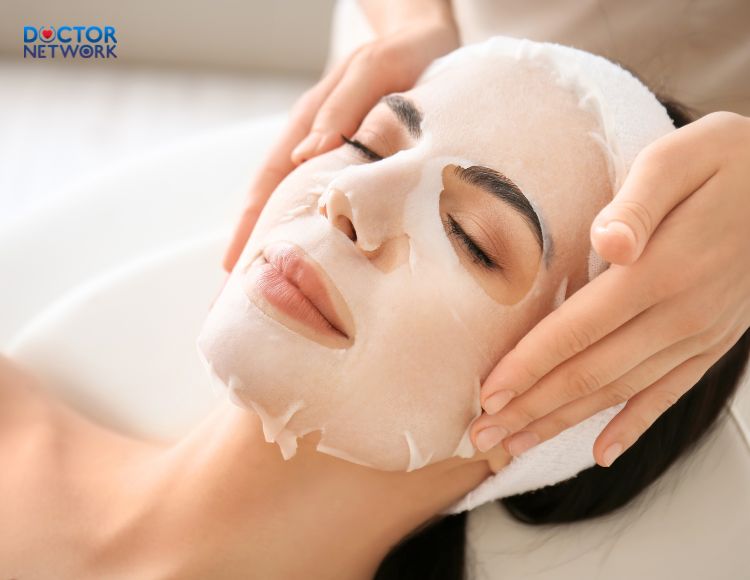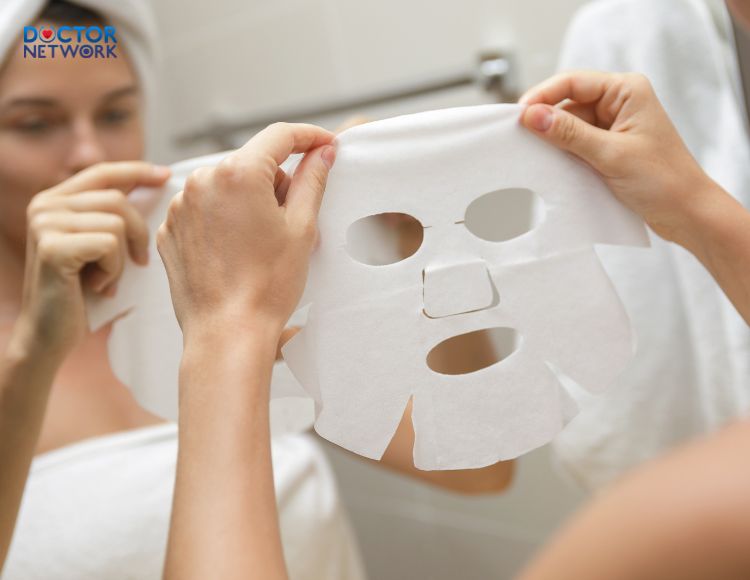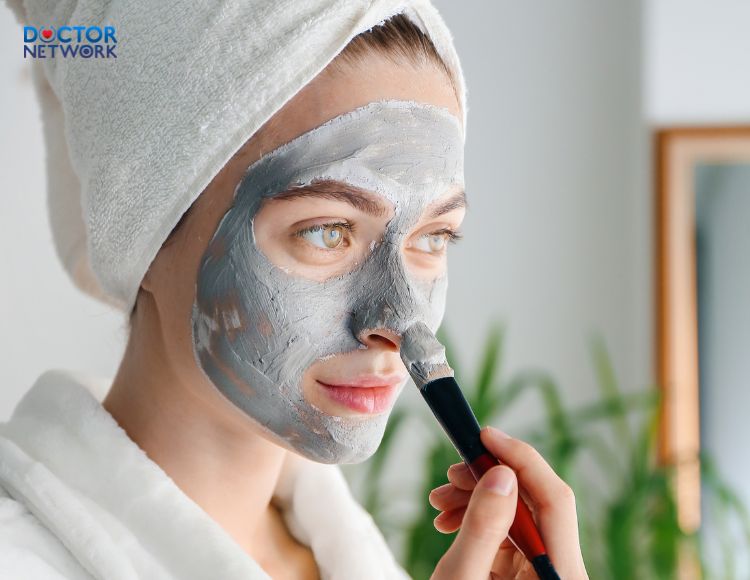One of the most popular and effective skincare methods is the use of face masks. A common question many people ask is, “How often should you use a face mask weekly?” The answer to this question depends on various factors, including skin type, the type of mask used, and individual skincare goals. In this article, we will explore the factors that influence the frequency of mask usage, as well as provide some general recommendations based on modern medical perspectives.
Skincare through Face Masking
Skincare through face masking is a crucial routine in daily skincare, serving multiple purposes such as moisturizing, deep cleansing, acne reduction, and even diminishing signs of aging. Proper use of face masks can bring significant effects, improving the condition and appearance of the skin.
- Moisturizing: Moisturizing masks contain ingredients like hyaluronic acid, glycerin, and natural oils, providing essential moisture to the skin, making it softer and smoother.

Moisturizing masks are the most commonly used type of mask
- Deep Cleansing: Deep cleansing masks often contain activated charcoal or clay, helping to remove sebum, dirt, and dead skin cells from the pores, reducing congestion and preventing acne.
- Acne Reduction: Acne-reducing masks contain ingredients such as salicylic acid, tea tree, and sulfur, helping to control oil, soothe inflammation, and reduce acne outbreaks.
- Anti-Aging: Anti-aging masks typically contain peptides, retinol, or vitamin C, which stimulate collagen production, reduce wrinkles, and even out skin tone.
Masking differs from other skincare methods such as using daily moisturizers or periodic exfoliation in that masks provide a large amount of nutrients designed to penetrate deeply into the skin and take effect in a short time. This helps to enhance skincare effectiveness more quickly and substantially than using ordinary skincare products. However, the use of masks must be adjusted appropriately to the frequency and skin type of each person to avoid irritation or damage to the skin.
How Often Should You Use a Face Mask Weekly?
Determining the appropriate frequency of face masking in a week is crucial in ensuring the skin receives necessary care without being overwhelmed. While there is no fixed rule for everyone, general recommendations often suggest masking from 1 to 3 times per week, depending on the skin type and mask used.
- General Recommendations:
- Oily and Acne-Prone Skin: For those with oily or acne-prone skin, using deep cleansing or acne-reducing masks may be done 2-3 times a week to control oil and minimize acne.
- Dry and Sensitive Skin: Conversely, for dry or sensitive skin, applying moisturizing or soothing masks should be limited to 1-2 times a week to avoid irritation or disrupting the skin’s natural moisture balance.

How Often Should You Use a Face Mask per Week? – 1 to 2 times for dry, sensitive skin.
- How Often Should You Use a Face Mask per Week? – Combination Skin: Combination skin may require a more flexible schedule, using a combination of different masks, with frequency adjusted based on specific facial areas.2. Specific Frequency Notes:
- Type of Mask: Masks containing strong ingredients like acids or retinol should be used less frequently (once a week) compared to moisturizing or gentle cleansing masks.
- Skincare Goals: Depending on specific skincare goals (acne reduction, moisturizing, anti-aging), the frequency may need to be fine-tuned to optimize benefits and minimize risks.
- Skin Reaction: Observe how your skin reacts to masking and adjust the schedule accordingly. If irritation occurs, reduce the frequency of use and consult a dermatologist.
In conclusion, choosing the right frequency for face masking requires understanding one’s skin type and specific skincare goals. Masking correctly and at the appropriate frequency not only helps improve skin condition but also contributes to maintaining healthy, youthful skin.
The Influence of Skin Type on Face Mask Frequency
Understanding one’s skin type is the first crucial step in determining the appropriate frequency for face masking. Skin type can significantly affect how skin reacts to different masks, thus influencing the choice of usage frequency for optimal safety and effectiveness.
- Skin Type Classification
- Oily Skin: This skin type often produces a large amount of oil, is prone to acne, and has large pores. Deep cleansing and oil-control masks can help improve skin condition, but should be limited to 2-3 times a week to avoid over-drying the skin.
- Dry Skin: Characterized by a lack of moisture and may be flaky or tight. Moisturizing masks should be used 1-2 times a week to nourish and replenish skin moisture.
- Combination Skin: A mix of oily and dry areas, typically oily in the T-zone (forehead, nose, chin) and dry in other areas. Mask application should be based on specific areas, with a frequency of 1-3 times a week, depending on the needs of each zone.
- Sensitive Skin: Easily irritated, red, and itchy when exposed to skincare products. Masks for sensitive skin should be used cautiously, with a frequency of about once a week, prioritizing products with gentle ingredients.
- Specific Examples of Appropriate Frequency
- Oily Skin: Apply oil-control and deep cleansing masks 2-3 times a week.
- Dry Skin: Use moisturizing masks 1-2 times a week to enhance hydration.
- Combination Skin: Apply moisturizing masks to dry areas and oil-control masks to the T-zone, with a total of 1-3 times a week depending on the area.
- Sensitive Skin: Choose masks for sensitive skin, apply once a week, and always monitor skin reactions.
Identifying skin type and choosing the right products and frequency for face masking is crucial in maintaining healthy skin and achieving desired skincare effects. Medical advice recommends that listening to and observing skin reactions after each masking session is the best way to adjust and optimize individual skincare routines.
The Importance of Choosing the Right Mask Type
Choosing the correct mask type according to the specific needs of your skin is key to ensuring optimal skincare effectiveness. With the variety of masks available on the market, understanding the goals and ingredients helps users make the best choice.
- Evaluation of Popular Mask Types
- Moisturizing Masks: Contain ingredients like hyaluronic acid and glycerin, which help replenish skin moisture, suitable for dry skin or skin needing hydration.
- Deep Cleansing Masks: Often contain activated charcoal or clay, which help absorb sebum and dirt from pores, suitable for oily and acne-prone skin.

Deep Cleansing Masks often contain activated charcoal or clay, helping to absorb sebum and dirt from pores
- Acne Reduction Masks: Include ingredients such as salicylic acid, tea tree, or sulfur, aimed at reducing inflammation and controlling acne.
- Anti-Aging Masks: Contain ingredients like retinol, peptides, and vitamin C, which help stimulate collagen production, reduce wrinkles, and improve skin elasticity.
Guidelines for Choosing the Right Mask
- Identify Skin Needs: First, determine your current skin condition and skincare goals. This may include reducing acne, moisturizing, or anti-aging.
- Understand Ingredients: After identifying your skincare goals, learn about the ingredients of the masks. Choose products containing ingredients that align with your skincare goals and ensure that you are not allergic to any components.
- Choose According to Skin Type: Select a mask type that is appropriate for your specific skin type, such as oily, dry, combination, or sensitive, to ensure the best care for your skin.
- Consult Professionals: When in doubt or needing further advice, do not hesitate to consult dermatology experts. They can provide professional advice based on your specific skin condition.
Related Studies
- University of California, San Francisco Study: The study showed that applying moisturizing masks twice a week helps improve skin elasticity and reduce wrinkles.
- Seoul University Study: The study indicated that using clay masks once a week helps reduce sebum secretion and tighten pores.
This article has provided information on “How Often Should You Use a Face Mask Weekly” and related knowledge. We hope you find this information helpful.
References:
https://www.healthline.com/health/beauty-skin-care/how-often-should-you-use-a-face-mask
Kiểm Duyệt Nội Dung
More than 10 years of marketing communications experience in the medical and health field.
Successfully deployed marketing communication activities, content development and social networking channels for hospital partners, clinics, doctors and medical professionals across the country.
More than 6 years of experience in organizing and producing leading prestigious medical programs in Vietnam, in collaboration with Ho Chi Minh City Television (HTV). Typical programs include Nhật Ký Blouse Trắng, Bác Sĩ Nói Gì, Alo Bác Sĩ Nghe, Nhật Ký Hạnh Phúc, Vui Khỏe Cùng Con, Bác Sỹ Mẹ, v.v.
Comprehensive cooperation with hundreds of hospitals and clinics, thousands of doctors and medical experts to join hands in building a medical content and service platform on the Doctor Network application.

























